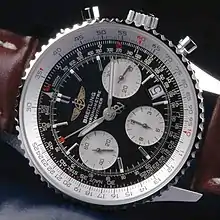The Breitling Navitimer is a watch that was released in 1954 in Switzerland by Breitling SA. Since then it has been one of the best selling watches produced by Breitling.
History

In the 1940s, Breitling added a circular slide rule to the bezel of its Chronomat models. This bezel became most associated with the Navitimer, launched in 1954.[1] The name Navitimer comes from two words were used to describe its purpose: Navigation and Timer.[2] During the 1950s and 1960s, a version of the Navitimer was offered by the Aircraft Owners and Pilots Association with the AOPA logo on the dial.
In 1961, Scott Carpenter, one of the original astronauts in the Mercury space program, tasked Breitling with incorporating a 24-hour dial instead of the normal 12-hour dial, due to lack of day and night in space travel. Breitling produced the 24-hour Navitimer, which Carpenter wore on his 1962 space flight. Breitling proceeded to produce a commercial version of the 24-hour version, the Cosmonaute Navitimer, with both Breitling and AOPA logos.[3]
The first automatic Navitimer chronograph was introduced to the public in 1969; its movement was co-developed by Breitling, Dubois-Depraz, Heuer, and Hamilton.[2]
See also
References
- ↑ "Publication of my work in The British Horological Journal". Kurt Broendum. 2012-08-27. Retrieved 2023-06-22.
- 1 2 Erhardt, Paul (Mar 24, 2020). "An Icon of the Skies: A brief history of the Breitling Navitimer". SecondTime. Retrieved 2020-07-16.
- ↑ "Buy Breitling Navitimer Watches Online". Breitling. Archived from the original on 13 June 2018. Retrieved 13 June 2018.